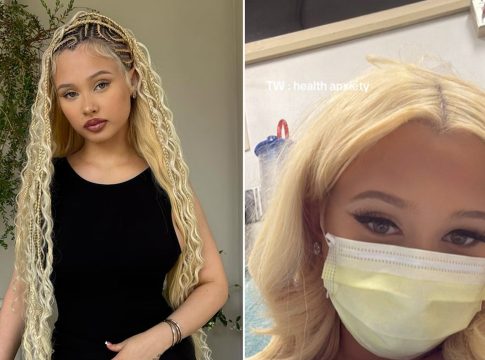Understanding Health Anxiety: Voices of Vulnerability
In today’s digital world, open discussions about mental health are becoming increasingly common, allowing individuals to share their experiences and struggles in authentic ways. A recent TikTok post by 19-year-old Alabama Barker sheds light on a prevalent yet often misunderstood aspect of mental health: health anxiety. As the daughter of prominent figures in the entertainment industry, Alabama chooses to use her platform to raise awareness about her personal journey with severe health anxiety—offering strength and connection to others who might feel similarly.
The Reality of Health Anxiety
Alabama’s heartfelt video articulates the intense and often debilitating nature of health anxiety, describing it as a constant battle with one’s own thoughts and feelings. She shared specific and frightening symptoms, such as:
- Dizziness
- Head pressure
- Eye floaters
- Light sensitivity
- Derealization
- Severe fatigue
These symptoms can be overwhelming, creating a feeling of being trapped in a perpetual state of unease. Despite reassurances from healthcare professionals that she is physically well, the emotional and psychological turmoil often overshadows these reassurances.
Why It Matters
Alabama’s decision to share her story is critical; it highlights the often invisible nature of health anxiety. Many individuals grapple with similar feelings but may feel isolated or misunderstood. Alabama’s candidness serves as a reminder that mental health challenges are worthy of discussion and understanding.
The Two Faces of Health Anxiety
According to specialists at the Cleveland Clinic, health anxiety can manifest in two distinct areas:
-
Somatic Symptom Disorder (SSD): This condition involves significant distress about physical symptoms. People may experience genuine medical concerns that are exacerbated by disordered thoughts and feelings.
- Illness Anxiety Disorder (IAD): Previously known as hypochondria, this condition involves an intense fear of having a serious illness, often persisting despite medical assessments confirming good health.
Educating oneself about these disorders can be a powerful step toward understanding and ultimately managing these feelings.
Practical Strategies for Coping
If you or someone you know is facing similar challenges, consider these strategies to promote mental well-being:
-
Mindfulness Practices: Engage in mindfulness or meditation to ground yourself in the present moment, reducing anxiety about future health concerns.
-
Journaling: Express thoughts and emotions on paper. This can help process feelings and clarify worries.
-
Talk to Someone: Whether it’s a trusted friend, family member, or therapist, sharing your feelings can provide relief and perspective.
- Limit Health-Related Searches: Reducing online searches about symptoms can lessen anxiety and improve mental clarity.
Empowerment Through Connection
Alabama Barker’s bravery in voicing her struggles not only fosters a sense of community but also empowers others to seek help and support. If you’re battling similar feelings of anxiety regarding health, remember that you’re not alone. Resources are available, such as the Crisis Text Line, where you can text “STRENGTH” to 741-741 to speak with a certified counselor.
Conclusion
By sharing her experiences, Alabama reminds us all that mental health issues like health anxiety are valid and deserving of attention. It’s vital to cultivate an environment of understanding and compassion, not just for ourselves but for others navigating similar paths. Together, we can break down the stigma and foster a culture of openness and healing surrounding mental health.

Covers wellness, nutrition, mental health, and daily life tips.
Bio: Talia brings a background in health journalism and holistic living to help readers live better, one tip at a time.

